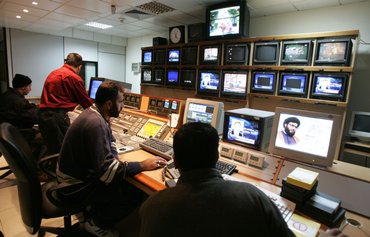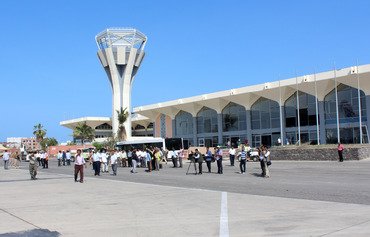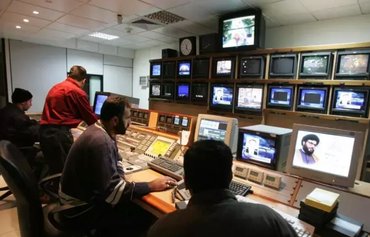ADEN -- Journalists and media groups in Yemen are calling on the Houthis to stop violating media freedoms and return broadcasting equipment they confiscated from six Sanaa radio stations they raided last week.
The Houthis shut down six radio stations in Sanaa after broadcasters reportedly refused to air the group's war propaganda, including pro-Houthi anthems, or because they had broadcast music it considers a violation of Islam.
Yemeni media professionals described the raid as an illegal and arbitrary act.
According to the Yemeni Journalists Syndicate, the Houthis shut down the Sawt al-Yaman (Voice of Yemen) radio station.
![A Yemeni sound engineer works at the studio of the Somara FM radio station in Sanaa, on World Radio Day, February 13, 2021. [Mohammed Huwais/AFP]](/cnmi_am/images/2022/02/02/33826-Yemen-sound-board-600_384.jpg)
A Yemeni sound engineer works at the studio of the Somara FM radio station in Sanaa, on World Radio Day, February 13, 2021. [Mohammed Huwais/AFP]
![Yemeni talk-show hosts chat as they record a programme at the studio of the Somara FM radio station in Sanaa, on February 13, 2021. [Mohammed Huwais/AFP]](/cnmi_am/images/2022/02/02/33827-Yemen-radio-hosts-600_384.jpg)
Yemeni talk-show hosts chat as they record a programme at the studio of the Somara FM radio station in Sanaa, on February 13, 2021. [Mohammed Huwais/AFP]
"Security forces from the de facto authorities in Sanaa stormed the radio station on Tuesday and closed it," the syndicate said, adding that it was shut "illegally" under the pretext that it needed to obtain certain permits.
Five other Sanaa radio stations were closed during the Houthis' crackdown: al-Oula, Alwan, al-Quran, Delta and Grand FM.
The journalist syndicate denounced "arbitrary measures that restrict freedom of expression", calling for radio broadcasts to resume immediately.
Pressuring station owners
Twelve armed men stormed the Sawt al-Yaman studios "without legal justification... nor prior warning", station director Majali al-Samadi told Al-Mashareq.
What happened is regrettable, he said, describing the "shock" he felt when he received the news of the group's actions.
"They spray painted the surveillance cameras to prevent them from documenting the group's actions, but the cameras recorded their arrival and entry into the radio station," he said.
"Local radio stations are committed to broadcasting weekly programmes for the group and its project, free of charge, in compliance with a condition set by the Houthis for allowing the radio stations to operate," al-Samadi said.
Despite these concessions, the Houthis have continued to target local stations, he said, adding that this state of affairs has made him want to leave Yemen.
Al-Samadi said the Houthi-controlled Ministry of Information in Sanaa is demanding that the station pay a hefty sum to renew its licence to operate.
According to a local radio station official, the Houthis have been pressuring station owners to "pay between one and two million YER ($4,000 to $8,000) annually to renew their licences to operate".
They also are forcing station owners to "deposit two million YER ($8,000) in a bank account as a financial guarantee", he told Al-Mashareq, speaking on condition of anonymity.
Any violation of these orders will mean an interruption in broadcasting and great financial losses for the radio stations, the official said.
The Houthis have imposed their harsh interpretation of Islam in areas of Yemen they control -- most of the country's north -- which include strict rules on dress, gender segregation and entertainment, including a ban on most forms of music.
A number of Houthi officials have criticised the stations for broadcasting songs, stipulating that only zawamel -- short-form poems or anthems used by the Houthis as a vehicle for propaganda -- receive airtime, the official said.
"Radio stations must broadcast only the group's zawamel, especially on stations in Ibb and Amran provinces, which are under the group's control," he said.
Closure, imprisonment, persecution
The Media Freedoms Observatory in Yemen condemned the Houthis' actions in a January 26 statement, calling on the Houthis to stop violating media freedoms and return broadcasting equipment to the stations.
Confiscating the broadcasting equipment was "a reprehensible act that reflects the narrow-mindedness of the de facto authority" in Sanaa, said Fouad Qassem, editor-in-chief of the Yemen Etihadi electronic newspaper.
The Houthis do not accept "any opinion that differs from theirs, nor do they allow any free voice", he said.
"They force all media outlets in the areas under their control to broadcast what serves their interests," and if that does not happen, "the consequences are closure, imprisonment and persecution," Qassem said.
"For that reason, most newspapers, radio stations and offices of channels that disagree with the Houthis have been closed," said journalist Khaled Ahmed.
The storming of the six radio stations comes "as part of the crackdown on media freedoms that the Houthi militia has been engaged in since it staged its 2014 coup against state institutions", he said.

![A Yemeni sound engineer works at the studio of the private Somara FM radio station Sanaa, on February 13, 2021, celebrating World Radio Day. [Mohammed Huwais/AFP]](/cnmi_am/images/2022/02/02/33825-Yemen-sound-engineer-600_384.jpg)






